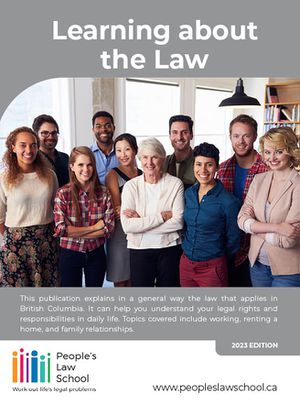About Learning about the Law: Difference between revisions
Drew Jackson (talk | contribs) No edit summary |
No edit summary |
||
| (51 intermediate revisions by 5 users not shown) | |||
| Line 1: | Line 1: | ||
{{Learning about the Law Wikibook TOC}} | |||
{{Learning about the Law Wikibook TOC}}This | This publication explains in a general way the law that applies in British Columbia and in Canada. It can help you understand your legal rights and responsibilities under the law. | ||
At People’s Law School, we believe accurate, plain English information can help people take action to work out their legal problems. '''This publication is not intended as legal advice.''' For help with a specific legal problem, <span class="noglossary">contact</span> a legal professional. Some sources of legal help are highlighted in the [[Find Out More in Learning about the Law|Find Out More]] section. | |||
We tried to keep the language easy, but some parts may still be hard. Most words in bold are defined in the section [[What the Words Mean in Learning about the Law|What the Words Mean]]. | |||
The information is current to February 2023. | |||
== Acknowledgements == | == Acknowledgements == | ||
Contributors to this edition of ''Learning about the Law'': | |||
* | * Writing, editing and legal <span class="noglossary">review</span>: Manjeet K. Chana, Drew Jackson, Spencer Keene, Veronica Lorimer | ||
* Support: Elena Renderos-Vasquez | |||
* | |||
The People's Law School acknowledges the contribution of the [https://justiceeducation.ca/ Justice Education Society] in earlier versions of this publication, as well as the contributions of many writers and reviewers. | |||
This publication was made possible through the funding support of the [https://www.lawfoundationbc.org/ Law Foundation of BC], the [https://www.notaryfoundation.ca/ Notary Foundation of BC], the [https://www.justice.gc.ca/ Department of Justice Canada], and the [https://gov.bc.ca/ Province of British Columbia]. | |||
== About People's Law School == | |||
[[People's Law School]] is a non-profit society in British Columbia, dedicated to making the law accessible to everyone. We provide free education and information to help people effectively deal with the legal problems of daily life. | |||
[[File:Peopleslawschoollogo-horizontal.jpg|250px|link=]] | |||
:1433 - 1130 W Pender Street | |||
:Vancouver, BC V6E 4A4 | |||
:604-331-5400 | |||
:[mailto:info@peopleslawschool.ca info@peopleslawschool.ca] | |||
:[http://www.peopleslawschool.ca www.peopleslawschool.ca] | |||
[[ | [[image:Learning_about_the_Law_cover_image.jpg|thumb|left|300px|Cover of the print edition]] | ||
{{Learning about the Law Wikibook Navbox}} | {{Learning about the Law Wikibook Navbox}} | ||
__NOGLOSSARY__ | |||
Latest revision as of 15:40, 9 March 2023
This publication explains in a general way the law that applies in British Columbia and in Canada. It can help you understand your legal rights and responsibilities under the law.
At People’s Law School, we believe accurate, plain English information can help people take action to work out their legal problems. This publication is not intended as legal advice. For help with a specific legal problem, contact a legal professional. Some sources of legal help are highlighted in the Find Out More section.
We tried to keep the language easy, but some parts may still be hard. Most words in bold are defined in the section What the Words Mean.
The information is current to February 2023.
Acknowledgements
Contributors to this edition of Learning about the Law:
- Writing, editing and legal review: Manjeet K. Chana, Drew Jackson, Spencer Keene, Veronica Lorimer
- Support: Elena Renderos-Vasquez
The People's Law School acknowledges the contribution of the Justice Education Society in earlier versions of this publication, as well as the contributions of many writers and reviewers.
This publication was made possible through the funding support of the Law Foundation of BC, the Notary Foundation of BC, the Department of Justice Canada, and the Province of British Columbia.
About People's Law School
People's Law School is a non-profit society in British Columbia, dedicated to making the law accessible to everyone. We provide free education and information to help people effectively deal with the legal problems of daily life.

- 1433 - 1130 W Pender Street
- Vancouver, BC V6E 4A4
- 604-331-5400
- info@peopleslawschool.ca
- www.peopleslawschool.ca

| |||||||||||||||||||||||||||||

